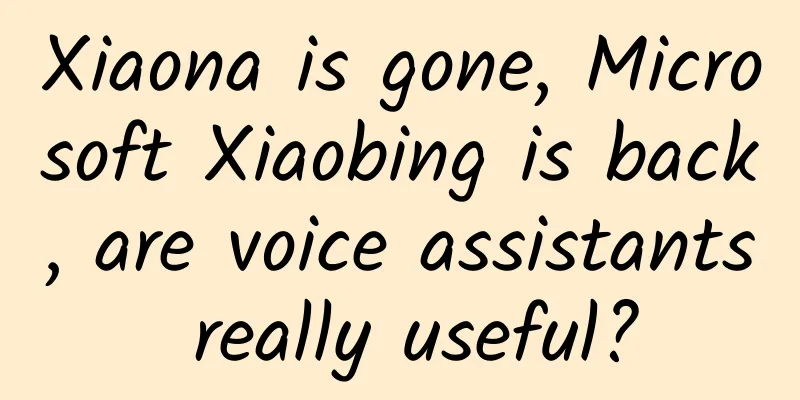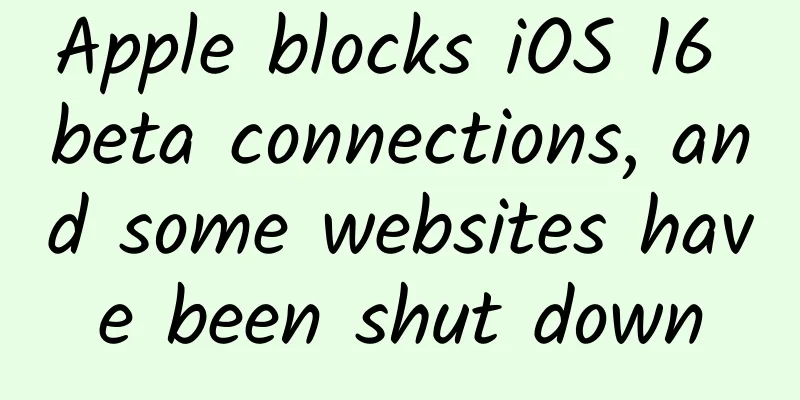Xiaona is gone, Microsoft Xiaobing is back, are voice assistants really useful?

|
After Windows 10 2004 separated Cortana and the system search function into independent applications that can be uninstalled, Microsoft officially announced the end of technical support for third-party Cortana. iOS and Android versions of the app will be removed from the app store; the Cortana integrated into the Harman Kardon Invoke speaker and the first-generation Surface headphones is also scheduled to end support early next year, and affected users will receive Microsoft gift cards worth $25-50 as compensation. According to the plan, Cortana will continue to be integrated into Microsoft 365 applications to "move towards a transformative AI-driven assistant experience." The strategic contraction of Microsoft's Cortana voice assistant that began last year has finally come to an end, and the annoying Cortana will no longer "speak" silently. 01 Xiaona, who was destined to be a tragedy, finally passed away Unlike Cortana, which is now widely criticized by everyone on Windows 10 and people are scrambling to search for uninstallation methods online, Cortana (Chinese name: Microsoft Xiaona) released 6 years ago was the world's first intelligent voice assistant. Cortana can not only help users complete daily applications such as opening third-party applications, searching for files, sending and receiving emails, but also sing songs and recite ancient poems. Such an "intelligent" voice assistant was undoubtedly a black technology product at the time, much smarter than Siri, which answered irrelevant questions when it was released two years later. Cortana's name comes from the heroine of Microsoft's "Halo" series of games. In the game, Cortana is an artificial intelligence that accompanies the heroine. This allows people to quickly understand Cortana's functions, and it also has great appeal to "Halo" fans and game geeks. Technically, Cortana is designed to be cloud-driven, and all intelligent computing is done on cloud servers. The terminal only does lightweight integration, which is also the principle of mainstream voice assistants. This design is very suitable for building a cross-platform service. At that time, Microsoft Cortana was mainly used on mobile phones. In 2013, Microsoft acquired Nokia's mobile phone business and prepared to make great plans on Windows Phone. The original Cortana could make calls, send text messages, take notes, recognize music and have simple conversations through voice commands, and formed an ecosystem with its own PC system, becoming a key component of the plan to innovate the future Windows operating system. But most people who use smartphones nowadays have never had the chance to have a conversation with Cortana on their phones. When Cortana was released, WP phones experienced a decline in market share, and by 2016, WP phones only accounted for 0.5% of the market share. Now, except for geeks and collectors who insist on sentiment, you probably can't find a Lumia phone on the street anymore. In "Halo", Cortana finally chose to sacrifice herself to save the Master Chief, but in reality, WP phones that need Cortana's protection have completely disappeared. In fact, Cortana was "killed" along with WP phones four years ago. 02 Trapped in the terminal, pinning hopes on rival platforms Without the Windows Phone system, Cortana had to find a presence on other platforms. On May 26, 2015, Microsoft decided to promote Cortana to Android and iOS systems, and truly realized the positioning of "the world's first cross-platform intelligent personal assistant". Microsoft hopes to continue to promote the popularity of Cortana by relying on the huge number of users on these two system platforms. Judging from the subsequent performance, Microsoft's ideal is obviously full. In addition to achieving high-precision voice recognition, voice assistants also need to complete specific functions based on recognized commands to meet user needs. This requires voice assistants to obtain sufficient system control permissions. Cortana certainly has enough permissions in Windows systems to read information, send emails, call underlying hardware, etc. However, after being ported to Android or iOS as an application, not only will there be permission issues, but even the ability to maintain background voice wake-up with low power consumption cannot be guaranteed. It is impossible for every user who downloads Cortana to root or jailbreak. Secondly, voice assistants are pre-installed on Android and iOS systems, and manufacturers cannot ignore their own products and promote the voice assistant of Microsoft, a competitor. Moreover, the technology of Google Assistant is already ahead of Cortana, which makes users have no reason or motivation to download Cortana. Except for those who want to experience Cortana on mobile phones and have searched in stores, most people may not know that Cortana is hidden in the App Store until Microsoft announced that it would be removed from the App Store. 03 Belatedly launching the smart speaker Invoke When Microsoft promoted Cortana to other platforms, the technology of Google Assistant, a later-developed voice assistant, surpassed Cortana. It was not because Google's technology was more powerful, but because Google paid more attention to the hardware ecosystem earlier. Only 7 months after Microsoft released Cortana, Amazon, which had no mobile platform to support it, released the Echo series of smart speakers. In the year of its release, Echo's shipments reached 2.5 million units, and in 2016, sales doubled to 5.2 million units. Back in 2014, when Microsoft was asked whether it would launch on other platforms, Marcus Ash, one of the inventors of Cortana, said: "We will only consider other platforms after the Windows Phone version of Cortana is fully mature, and we will not consider developing low-level access functions for deep integration with iOS and Android." The evolution of voice assistants is based on a huge amount of data, and the WP mobile phone that Microsoft has been relying on for a long time only had a market share of 3% at its peak. In the end, the cross-platform was hit, and Microsoft finally released the smart speaker Invoke jointly launched with Manhattan. By this time, it was already 2017, and Amazon and Google's smart speakers abroad had occupied half of the market share; domestic smart speakers such as Tmall Genie, Xiaomi AI and Baidu also began to develop explosively. Microsoft only wanted to rely on a high-priced smart speaker of $199 to make up for a series of mistakes made by Cortana before. Cortana was on the road to being "killed" by Microsoft from the beginning to the end. 04 Do you use voice assistants frequently? Although Cortana has left the mobile and PC platforms, it does not mean that Microsoft has completely given up on voice interaction as a future entry point. From the news released by Microsoft, we can also see that Cortana will be integrated into Microsoft 365 applications as a voice assistant tool, and Cortana will be retained on the Xbox platform as a social assistant in preparation for its revival. This kind of assistant-oriented voice assistant can indeed play a role in improving productivity in future commercial offices. The search function is the most common scenario for PC users to use Cortana. Just like we usually search directly in the Win10 menu, we can also use the Cortana search box to extract data stored in Outlook emails, contacts, calendar applications, and the Internet. This way of inputting text was originally just a backup solution for Cortana when it is inconvenient for users to speak or the recognition rate is not high, but it has become the main way to use Cortana on the PC side, which also reflects the problem of voice assistant recognition rate and efficiency. On the mobile side, even Siri and Google Assistant, which have higher recognition rates, do not necessarily have higher usage rates. According to a survey report released by SUMO Heavy in 2019, the usage rate of voice assistants on smartphones is lower than previously expected. Nearly half of users have never used voice assistants on smartphones, and only 16% of users are active users on a daily basis. This is the result of a survey after voice assistants have appeared for 5 years and have been widely popularized in the market. It is conceivable how naive Microsoft was when it wanted to promote Cortana through WP phones. 05 The not-so-retarded Xiaobing sister is here Just like Amazon's Alex suggesting that its owner commit suicide, today's smart voice assistants all have some artificial mental retardation. Many manufacturers also use this cute and silly feature as the style of their own voice assistants, including Siri, Xiao Ai, Xiaodu, etc., which all have their own characteristics in language tuning. If it is not obsessed with improving productivity, a fun voice assistant that can make the owner happy may be more popular with users and more feasible. XiaoIce, the younger sister of Microsoft Cortana, is an example. Microsoft XiaoIce was officially launched by Microsoft in May 2014. It is a complete artificial intelligence underlying framework that integrates natural language processing, computer speech, and computer vision technologies. From the description, it is no different from voice assistants such as Cortana, but XiaoIce was originally designed for instant messaging. Unlike other voice assistants that focused on IQ at the time, Xiaobingjian took a different approach and chose the EQ route. Compared with other voice assistants that still communicate with users like relatives and have awkward conversations, Xiaobing seems to have the ability to chat and laugh since birth. No matter what questions or jokes are thrown, Xiaobing can catch them steadily. During the WeChat public beta, Xiaobing can join the chat as a group member and can also complete the WeChat group's operating instructions based on the conversation. What is important is that through communication and learning with users, each unique Xiaobing will be formed. However, it is precisely because Xiaobing's learning ability is too strong that Xiaobing in some WeChat groups has become a swearing Zaun girl, etc. Microsoft had to reduce Xiaobing's ability and finally closed the WeChat public account and public beta. Despite this, Xiaobing is still very popular. In addition to cooperating with other voice assistants, it also participates in literary creation and published the first poetry collection created by artificial intelligence in history, "The Sun Lost the Glass Window". Actively promote the establishment of social roles including host, financial summary writer, singer, painter, etc., and now has 5.1 million fans on Weibo. 06 What does your expected voice assistant look like? The reason why we emphasize the smart Xiaobing is that I think the future Cortana should be a combination of Xiaona and Xiaobing. Before that, voice assistants including Cortana must first take the route of accumulating EQ. As mentioned at the beginning, the evolution of voice assistants is based on a large amount of data, which determines that traditional voice assistants focus on task-based interaction, which is actually insufficient in terms of user data volume. This has led to slow progress in speech recognition rate and comprehension ability. For example, the way users communicate with Cortana through "gestures" has caused Cortana's recognition rate to decrease instead of increase. Only when voice assistants become humorous and personalized can the enthusiasm of users to interact with voice assistants be mobilized to a greater extent. Moreover, the interaction method does not need to be limited to voice. Text dialogue can eliminate a lot of embarrassment in talking to machines. The breadth and depth of information collected by seemingly meaningless jokes and chatting cannot be compared with simple functional dialogues. Xiao Ai and Xiao Bing are developing in this direction. Promoting the evolution of voice assistants through massive data may be a breakthrough in the future AI interaction revolution. The data generated by frequent conversations with users can not only improve the accuracy of voice command recognition, but also have great advantages in cultivating user habits. However, ideals are beautiful. In reality, it takes a lot of effort to make voice assistants "interesting". In addition to a huge amount of interaction data, there must be a sufficiently powerful underlying framework to implement feedback analysis and improvement. After all, not every company can develop a Xiaobing. The future Cortana will not be able to rise again by simply setting up a schedule and sending an email. Will it pick up Xiaobing again or find another way? Let's wait and see. |
>>: Latest ranking of global app downloads: TikTok continues to top the list
Recommend
If you point a flashlight at the sky, how long will it take for the light to fly out of the solar system?
This article is based on answering questions from...
With a range of 530 km, equipped with Tencent car networking, and 1.32 times the subsidy, Trumpchi GE3 530 starts pre-sale
With the gradual decline of new energy vehicle su...
It hurts! Do your heels always crack? The truth may not be that your skin is dehydrated. Be careful of these diseases.
When autumn and winter arrive, the skin on many p...
Practical video course production, promotion, and money-making video course with a monthly income of over 10,000 yuan
Free software and files Speaker: Xie Yinlong 0 ba...
The features that were cut are back? A comprehensive review of the new features in WeChat 8.0.2
A while ago, WeChat released version 8.0, which w...
How much does it cost to produce a real estate mini program on the market in Baishan?
Baishan real estate applet production price 1. Di...
Insights and marketing strategies for the maternal and infant industry
When those born after 1995 start to become parent...
Pinching, dripping glue, slime...are popular handmade toys also poisonous?
Review expert: Zhou Hongzhi, senior laboratory te...
No food or water for 40 days! This fish dad's way of raising a baby is shocking...
Identity Profile: Who is Otaki Six-line Fish? Sci...
4 methods and pain points of APP monetization!
If an app does not have a good commercial monetiz...
This is the most useful “APP recommendation rule” I have ever seen!
Before reading this article, you need to make sur...
Apple adjusts its product line layout: selling 4 iPhone models at the same time
The release of iPhone 6 has made headlines in maj...
Engine: The heart of a rocket
If the launch vehicle is the foundation of the de...
5700 words on private domain traffic
In the private domain, real users are staying, bu...
What is legitimate defense? How can we act bravely?
Mixed Knowledge Specially designed to cure confus...

![[Smart Farmers] “Rice on the Mountain” Causes Controversy? Here’s the Truth!](/upload/images/67f22ba434a01.webp)







